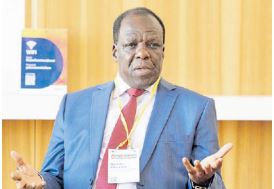
President William Ruto is set to assent to the Startups Bill, a crucial legislation that aims to provide a structured policy and legal framework to empower young innovators and entrepreneurs.
Cabinet secretary for Co-operatives and MSMEs, Wycliffe Oparanya, revealed this at the just-concluded Global Solutions Summit in Berlin, Germany, adding that the legislation introduces tax incentives to strengthen the business ecosystem, alongside support for incubators, accelerators, and investors.
“Additionally, a startup fund is to be established to provide critical financial backing, helping grassroots innovators scale and thrive,’’ Oparanya said.
The proposed law, already approved by both Parliamentary houses, if enacted, would compel startups to allocate at least 15 per cent of their budget to research and development (R&D) and require wholly Kenyan ownership to qualify for legal recognition, tax breaks, grants, incubation programmes, and credit guarantees.
Even so, it has sparked concerns, particularly around its requirement for wholly Kenyan ownership, with critics arguing that the proposed law could stifle growth by excluding startups with foreign co-founders or foreign investors that do not meet the bill’s ownership criteria.
Such startups, which have been a significant part of Kenya’s entrepreneurial rise, would be unable to access key benefits, limiting their growth potential.
“An entity shall be eligible to be registered as a startup and for admission into an incubation programme if the entity is wholly owned by one or more citizens of Kenya and at least fifteen per cent of the entity’s expenses can be attributed to research and development activities,” a section of the bill states.
The proposed law exemplifies a growing trend in
emerging markets to balance domestic economic empowerment with the need to
attract global investment.
For international stakeholders, it raises critical questions about how developing economies can foster local innovation without alienating the foreign capital that often fuels technological and business growth.
In
Kenya, MSMEs account for approximately 7.4 million enterprises, employing over
17 million people, who are the major drivers of household incomes and
socio-economic mobility.
In his speech, Oparanya highlighted how Kenya has made the MSME economy a key pillar of the national development agenda, through the Bottom-up Economic Transformation Agenda (BETA) that seeks to empower communities to thrive from the grassroots level.
He gave an example of Hustler Fund, which is a digital micro-credit initiative that has disbursed Sh65 billion to 20 million Kenyans, rehabilitated two million borrowers into the formal financial system, and mobilised Sh3 billion in savings, reducing reliance on predatory lenders.
He added that President William Ruto’s government has been keen to strengthen and support Savings and Credit Cooperatives (SACCOs), which remain an anchor of financial inclusion.
“Currently, over 14,000 registered Saccos are managing over Sh1.5 trillion in savings and providing affordable credit through a community-based model,’’ Oparanya said.
“Let me emphasize that a financially included MSME sector is not just a development goal; it is an economic imperative for job creation, poverty reduction, and sustainable livelihoods, central to the achievement of the Sustainable Development Agenda 2030.”
The Global Solutions Summit is an international conference aimed at addressing key policy challenges facing the G20 and G7 and other global governance fora.


















